外研版初中英语八年级上册 Module 5 Lao She's Teahouse. Unit 3 Language in use .课件(共32张PPT)
文档属性
| 名称 | 外研版初中英语八年级上册 Module 5 Lao She's Teahouse. Unit 3 Language in use .课件(共32张PPT) |
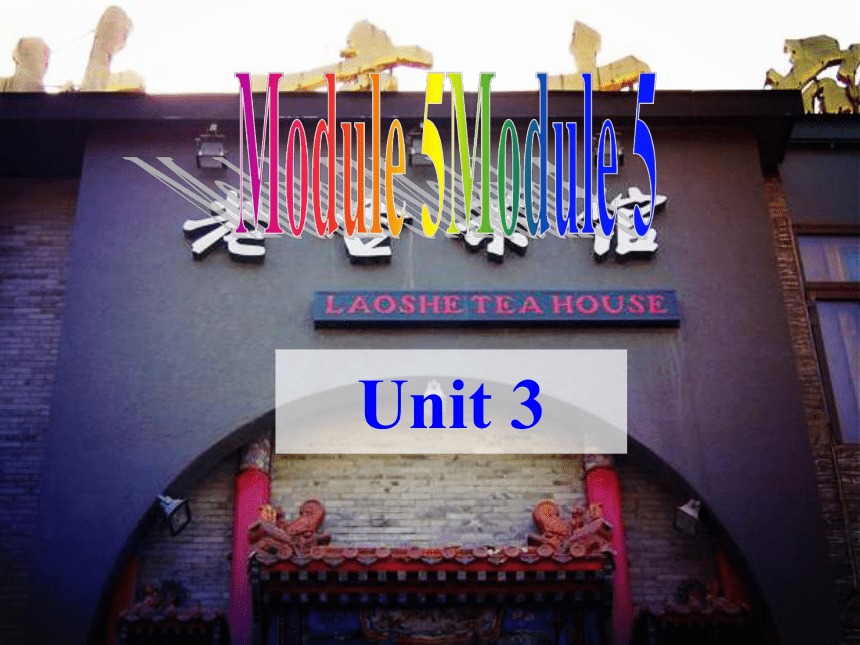
|
|
| 格式 | zip | ||
| 文件大小 | 2.2MB | ||
| 资源类型 | 教案 | ||
| 版本资源 | 外研版 | ||
| 科目 | 英语 | ||
| 更新时间 | 2020-07-29 00:00:00 | ||
图片预览

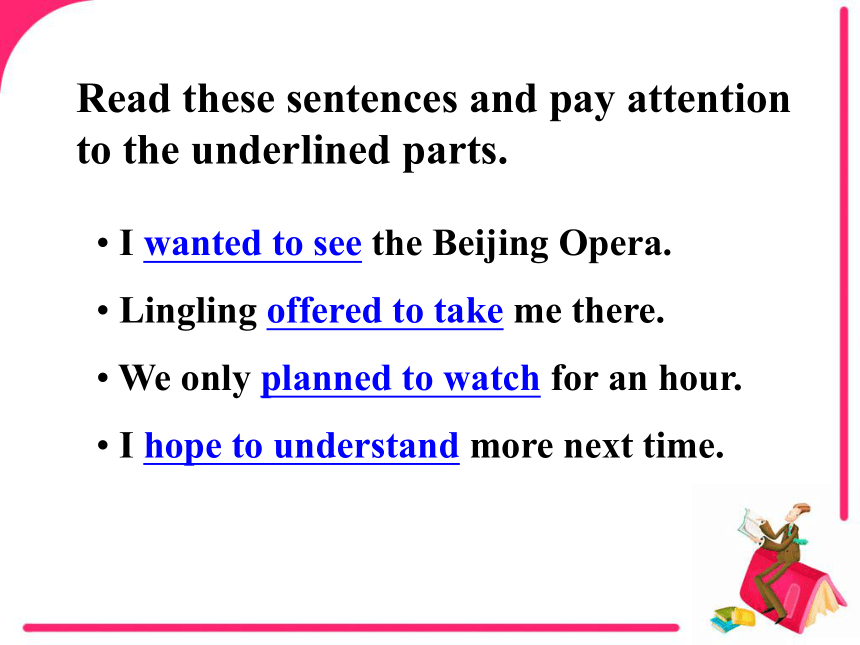
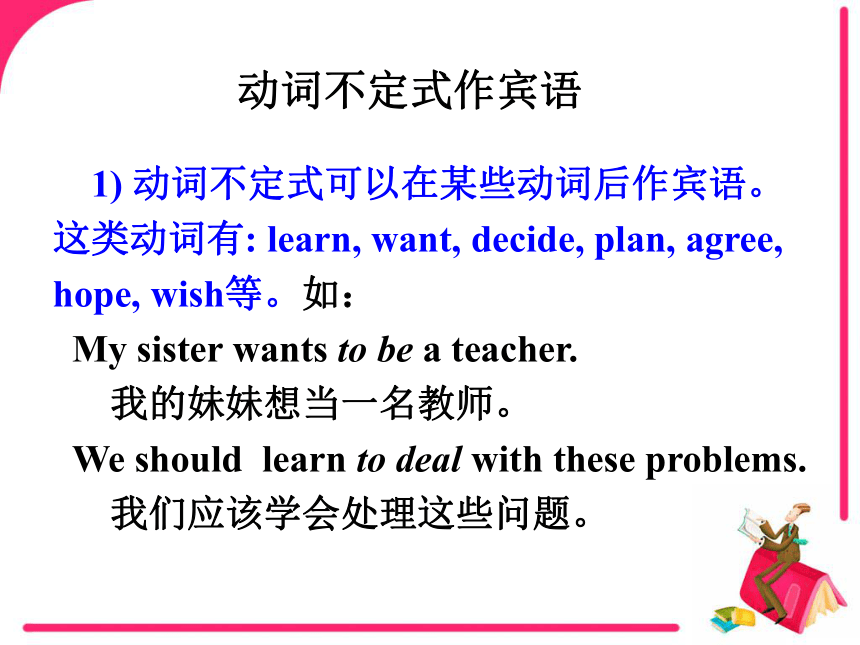
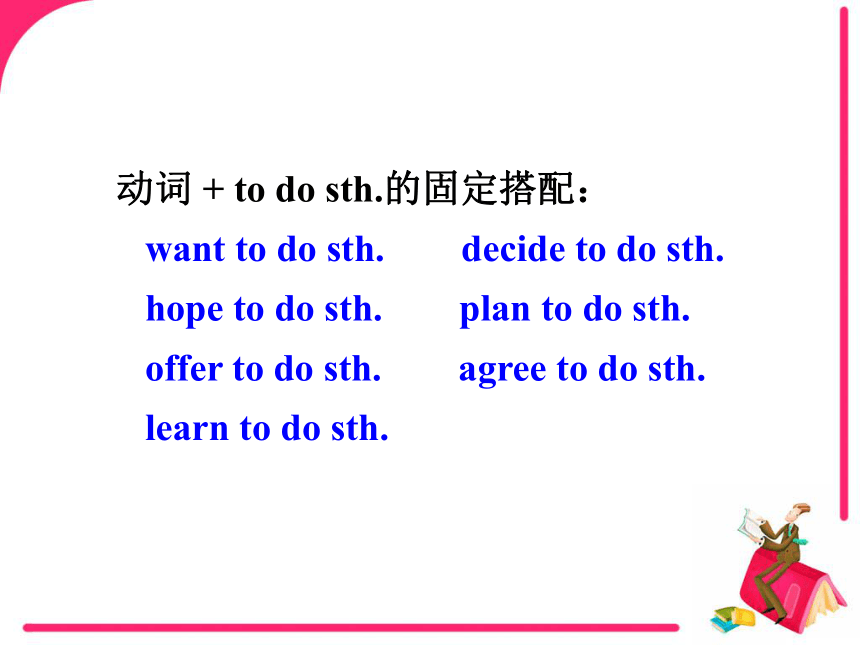
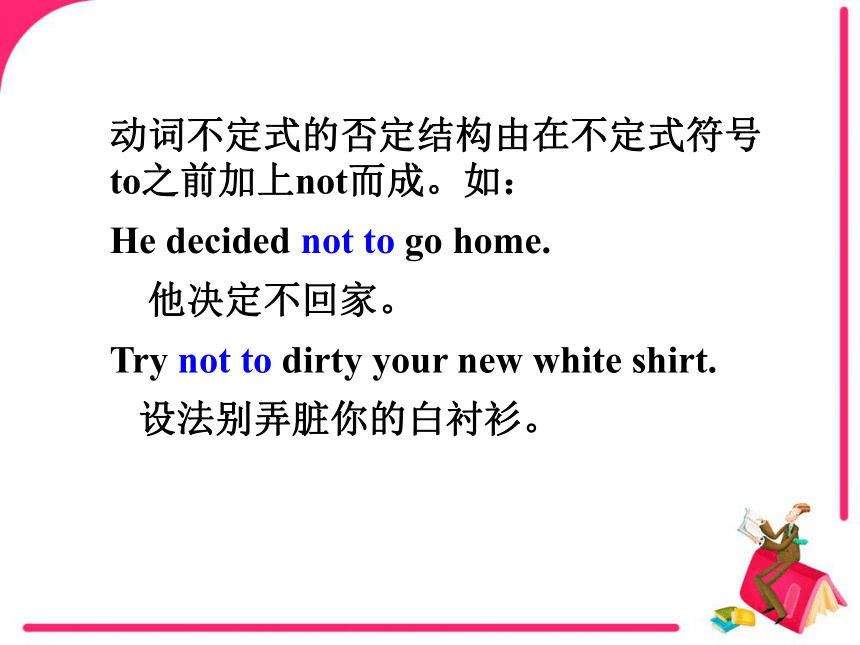
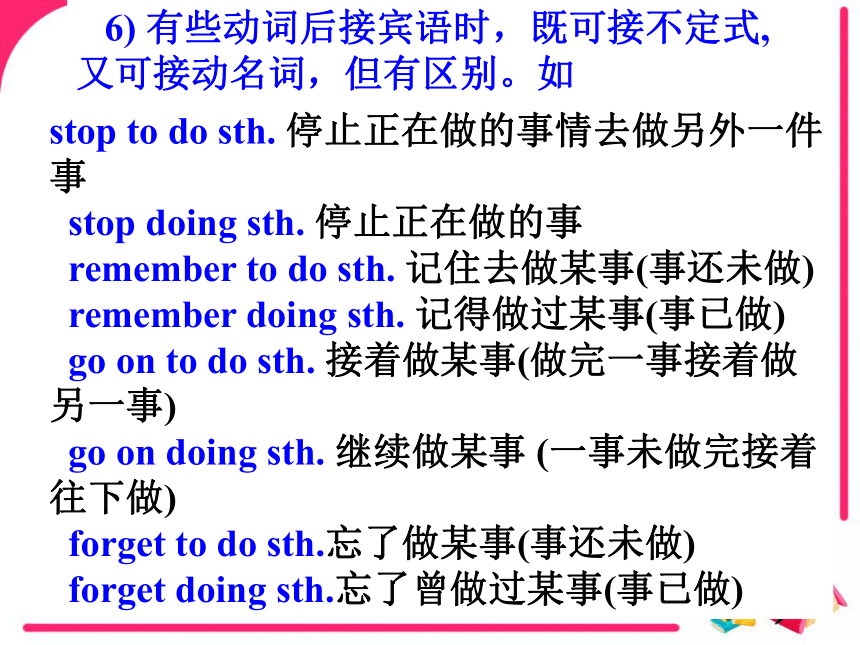
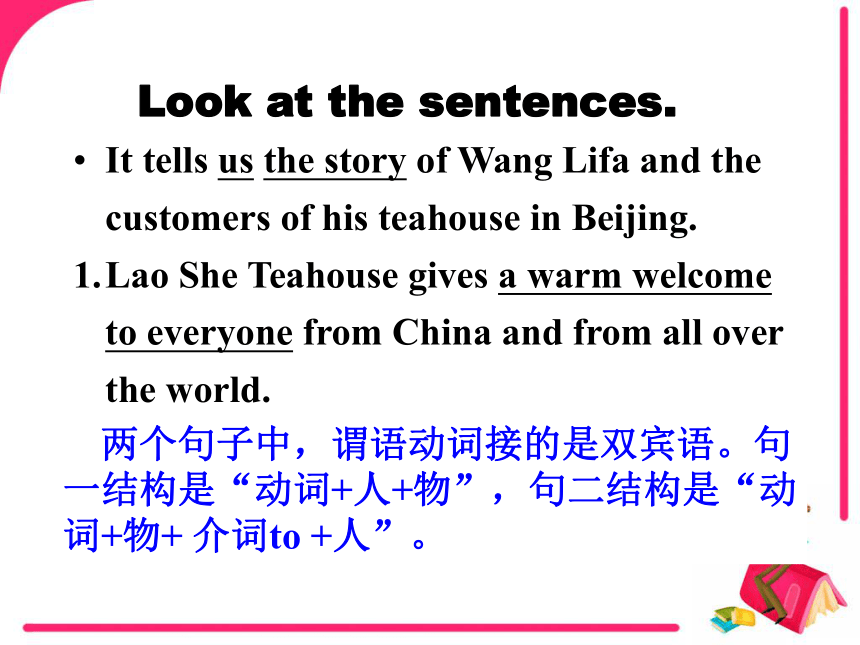

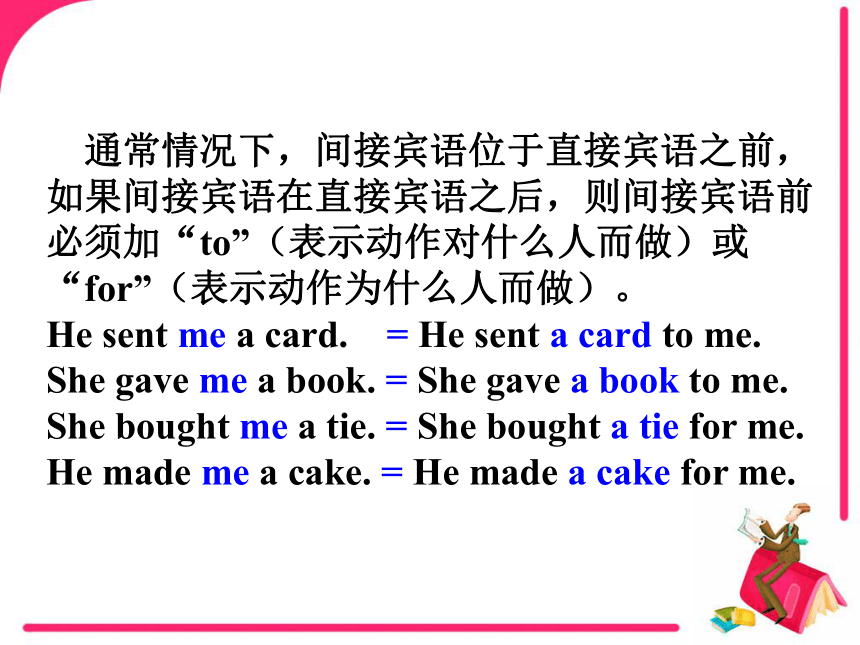
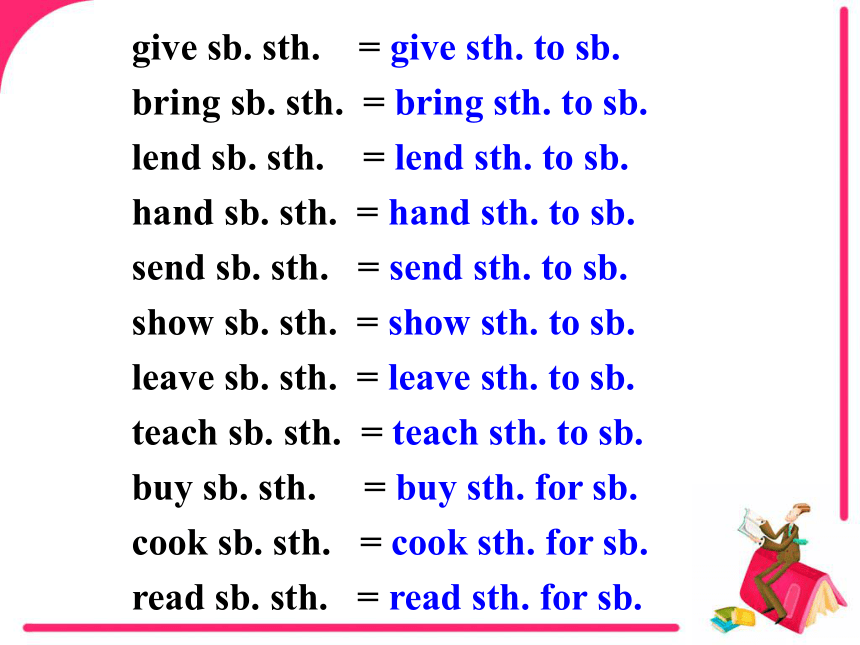
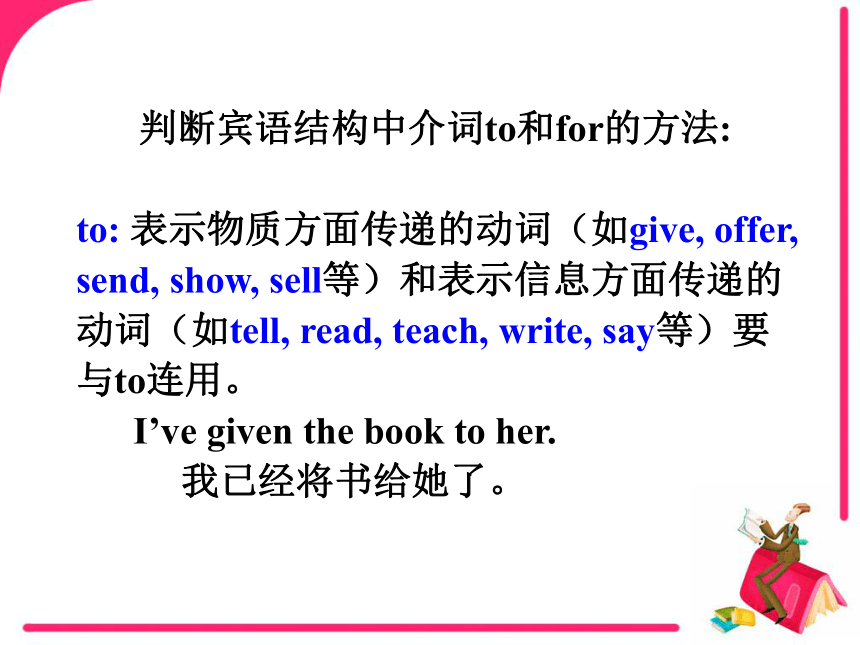
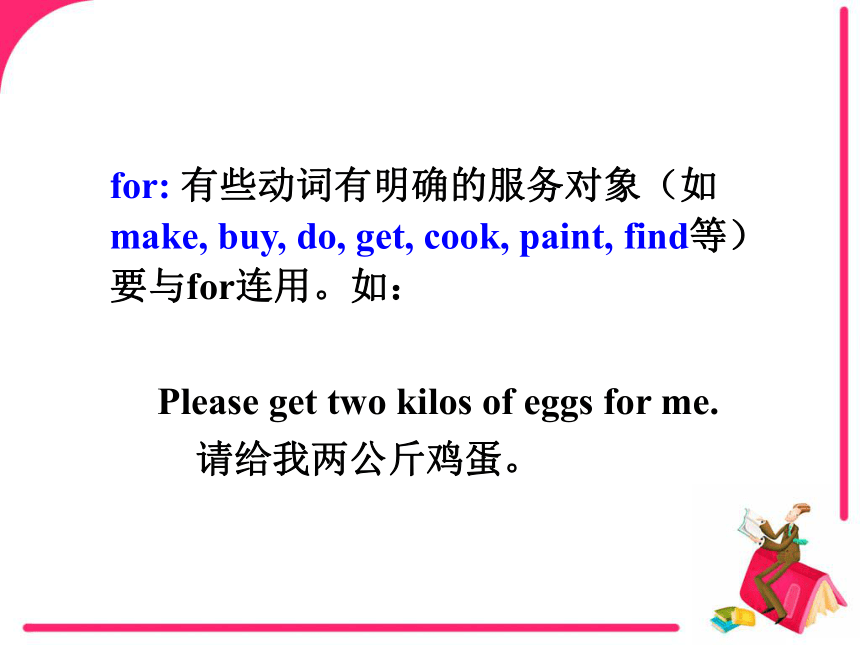
文档简介
(共32张PPT)
Unit
3
Module
5
Read
these
sentences
and
pay
attention
to
the
underlined
parts.
I
wanted
to
see
the
Beijing
Opera.
Lingling
offered
to
take
me
there.
We
only
planned
to
watch
for
an
hour.
I
hope
to
understand
more
next
time.
1)
动词不定式可以在某些动词后作宾语。这类动词有:
learn,
want,
decide,
plan,
agree,
hope,
wish等。如:
My
sister
wants
to
be
a
teacher.
我的妹妹想当一名教师。
We
should
learn
to
deal
with
these
problems.
我们应该学会处理这些问题。
动词不定式作宾语
动词
+
to
do
sth.的固定搭配:
want
to
do
sth.
decide
to
do
sth.
hope
to
do
sth.
plan
to
do
sth.
offer
to
do
sth.
agree
to
do
sth.
learn
to
do
sth.
动词不定式的否定结构由在不定式符号to之前加上not而成。如:?
He?decided?not?to?go?home.
他决定不回家。?
Try
not
to?dirty
your
new
white
shirt.
设法别弄脏你的白衬衫。
stop
to
do
sth.
停止正在做的事情去做另外一件事
stop
doing
sth.
停止正在做的事
remember
to
do
sth.
记住去做某事(事还未做)
remember
doing
sth.
记得做过某事(事已做)
go
on
to
do
sth.
接着做某事(做完一事接着做另一事)
go
on
doing
sth.
继续做某事
(一事未做完接着往下做)
forget
to
do
sth.忘了做某事(事还未做)
forget
doing
sth.忘了曾做过某事(事已做)
6)
有些动词后接宾语时,既可接不定式,又可接动名词,但有区别。如
Look
at
the
sentences.
It
tells
us
the
story
of
Wang
Lifa
and
the
customers
of
his
teahouse
in
Beijing.
Lao
She
Teahouse
gives
a
warm
welcome
to
everyone
from
China
and
from
all
over
the
world.
两个句子中,谓语动词接的是双宾语。句一结构是“动词+人+物”,句二结构是“动词+物+
介词to
+人”。
英语中,有些及物动词可以接两个宾语,即指人的间接宾语和指物的直接宾语,这两个宾语称为“双宾语”。句子结构为:“主语+及物动词+间接宾语+直接宾语”。如:
My?parents?bought?me?a?computer.
我父母给我买了一台电脑。
双宾语
通常情况下,间接宾语位于直接宾语之前,如果间接宾语在直接宾语之后,则间接宾语前必须加“to”(表示动作对什么人而做)或“for”(表示动作为什么人而做)。
He
sent
me
a
card.
=
He
sent
a
card
to
me.
She
gave
me
a
book.
=
She
gave
a
book
to
me.
She
bought
me
a
tie.
=
She
bought
a
tie
for
me.
He
made
me
a
cake.
=
He
made
a
cake
for
me.
give
sb.
sth.
=
give
sth.
to
sb.
bring
sb.
sth.
=
bring
sth.
to
sb.
lend
sb.
sth.
=
lend
sth.
to
sb.
hand
sb.
sth.
=
hand
sth.
to
sb.
send
sb.
sth.
=
send
sth.
to
sb.
show
sb.
sth.
=
show
sth.
to
sb.
leave
sb.
sth.
=
leave
sth.
to
sb.
teach
sb.
sth.
=
teach
sth.
to
sb.
buy
sb.
sth.
=
buy
sth.
for
sb.
cook
sb.
sth.
=
cook
sth.
for
sb.
read
sb.
sth.
=
read
sth.
for
sb.
to:
表示物质方面传递的动词(如give,
offer,
send,
show,
sell等)和表示信息方面传递的动词(如tell,
read,
teach,
write,
say等)要与to连用。
I’ve
given
the
book
to
her.
我已经将书给她了。
判断宾语结构中介词to和for的方法:
for:
有些动词有明确的服务对象(如make,
buy,
do,
get,
cook,
paint,
find等)要与for连用。如:
Please
get
two
kilos
of
eggs
for
me.
请给我两公斤鸡蛋。
用to侧重指动作的方向,表示“朝着,向着,对着”某人。
用for侧重指动作的受益者,表示“为了某人,替某人”。
常跟双宾语的动词有:
(需借助to的):bring,
give,
lend,
hand,
offer,
pass,
pay,
promise,
read,
return,
send,
show,
teach,
tell,
ask,
leave,
throw,
take,
write等。
Work
in
pairs.
Read
the
words
and
expressions,
and
then
talk
about
your
weekend
plans
by
using
them
to
help
you.
hope
how
about
let’s
want
why
don’t
we
why
not
would
like
—
I
want
to
see
the
Beijing
Opera?
—
Why
don’t
we
...?
—
How
about
going
to
Lao
She
Teahouse?
—
Why
not?
I
really
want
to
have
a
look.
—
OK,
I
would
like
to
...
—
Let’s
...
Read
the
passage
and
choose
the
correct
answer.
(
)
1.
You
would
find
the
passage
in
______.
a)
a
book
b)
a
school
newspaper
c)
a
magazine
(
)
2.
The
writer
_______.
a)
liked
the
play
b)
did
not
like
the
play
c)
did
not
say
he
liked
the
play
or
not
b
a
(
)
3.
The
actors
and
actresses
in
the
play
wore
______.
a)
the
same
clothes
as
today
b)
their
best
clothes
c)
clothes
of
the
first
half
of
the
twentieth
century
(
)
4.
Li
Nan
is
__________.
a)
a
famous
actor
b)
a
student
c)
an
actress
c
b
Around
the
world
Theatres
started
in
Greece
around
600
BC
audience
sat
on
stone
seats
watch
the
plays
Read
and
discuss
the
Greek
Theatre.
Greek
Theatre
埃庇道鲁斯是位于伯罗奔尼撒东北部的一座希腊古城,建于公元前4世纪的埃普道鲁斯露天剧场是希腊保存得最好的古剧场与古典建筑之一,剧场也以其极佳的声效而闻名于世,舞台上的声音能传到剧场的每个角落。
狄奥尼索斯剧场建于公元前6世纪,是最古老的露天剧场。在这足以容纳17,000人的剧场里曾经上演过无数场埃斯库罗斯、索福克勒斯和欧里庇得斯的悲剧作品及阿里斯托芬的喜剧作品。剧场依山坡而建,大得惊人,似凝结了天地大美之气。
埃普道鲁斯露天剧场
狄奥尼索斯剧场
Theaters
around
the
world
Act
out
a
scene
from
a
play.
Where
does
it
take
place?
Who
is
in
it?
What’s
the
story?
What
are
the
special
moments
in
it?
Module
task
I
________
that
my
parents
are
happy
and
healthy.
2.
I
don’t
_________
to
go
out
today.
I
am
very
tired.
3.
They
are
very
helpful.
They
________
to
help
me.
decide
hope
want
offer
plan
try
forget
I.
用方框中所给词的适当形式填空。
hope
want
offer
Exercise
4.
I
have
________
to
go
to
Beijing.
Nobody
can
stop
me.
5.
This
winter
we
_________
to
go
to
Australia
for
holidays.
6.
The
teacher
________
to
do
it
many
times,
and
he
was
successful
at
last.
7.
This
morning
I
_________
to
bring
my
book.
Can
I
borrow
yours?
decided
plan
tried
forgot
II.
按要求完成句子。
1.
agreed
/
to
/
buy
/
a
bike
/
for
me
/
my
parents.
(连词成句)
______________________________________
2.
to
/
welcome
/
our
new
/
school.
(连词成句)
_______________________________________
3.
visit
/
decide
/
we
/
next
week
/
to
/
the
museum.
(连词成句)
______________________________________
My
parents
agreed
to
buy
a
bike
for
me.
Welcome
to
our
new
school.
Next
week
we
decide
to
visit
the
museum.
4.
My
mother’s
main
interest
is
singing.(就画线部分进行提问)
___________________________________
5.
The
story
took
place
in
an
old
factory.
(就画线部分进行提问)
___________________________________
What
is
your
mother’s
main
interest?
Where
did
the
story
take
place?
6.
The
waiter
handed
the
salt
to
me.
(改为同义句)
___________________________________
7.
My
father
bought
a
new
bike
for
me.
(改为同义句)
___________________________________
My
father
bought
me
a
new
bike.
The
waiter
handed
me
the
salt.
Unit
3
Module
5
Read
these
sentences
and
pay
attention
to
the
underlined
parts.
I
wanted
to
see
the
Beijing
Opera.
Lingling
offered
to
take
me
there.
We
only
planned
to
watch
for
an
hour.
I
hope
to
understand
more
next
time.
1)
动词不定式可以在某些动词后作宾语。这类动词有:
learn,
want,
decide,
plan,
agree,
hope,
wish等。如:
My
sister
wants
to
be
a
teacher.
我的妹妹想当一名教师。
We
should
learn
to
deal
with
these
problems.
我们应该学会处理这些问题。
动词不定式作宾语
动词
+
to
do
sth.的固定搭配:
want
to
do
sth.
decide
to
do
sth.
hope
to
do
sth.
plan
to
do
sth.
offer
to
do
sth.
agree
to
do
sth.
learn
to
do
sth.
动词不定式的否定结构由在不定式符号to之前加上not而成。如:?
He?decided?not?to?go?home.
他决定不回家。?
Try
not
to?dirty
your
new
white
shirt.
设法别弄脏你的白衬衫。
stop
to
do
sth.
停止正在做的事情去做另外一件事
stop
doing
sth.
停止正在做的事
remember
to
do
sth.
记住去做某事(事还未做)
remember
doing
sth.
记得做过某事(事已做)
go
on
to
do
sth.
接着做某事(做完一事接着做另一事)
go
on
doing
sth.
继续做某事
(一事未做完接着往下做)
forget
to
do
sth.忘了做某事(事还未做)
forget
doing
sth.忘了曾做过某事(事已做)
6)
有些动词后接宾语时,既可接不定式,又可接动名词,但有区别。如
Look
at
the
sentences.
It
tells
us
the
story
of
Wang
Lifa
and
the
customers
of
his
teahouse
in
Beijing.
Lao
She
Teahouse
gives
a
warm
welcome
to
everyone
from
China
and
from
all
over
the
world.
两个句子中,谓语动词接的是双宾语。句一结构是“动词+人+物”,句二结构是“动词+物+
介词to
+人”。
英语中,有些及物动词可以接两个宾语,即指人的间接宾语和指物的直接宾语,这两个宾语称为“双宾语”。句子结构为:“主语+及物动词+间接宾语+直接宾语”。如:
My?parents?bought?me?a?computer.
我父母给我买了一台电脑。
双宾语
通常情况下,间接宾语位于直接宾语之前,如果间接宾语在直接宾语之后,则间接宾语前必须加“to”(表示动作对什么人而做)或“for”(表示动作为什么人而做)。
He
sent
me
a
card.
=
He
sent
a
card
to
me.
She
gave
me
a
book.
=
She
gave
a
book
to
me.
She
bought
me
a
tie.
=
She
bought
a
tie
for
me.
He
made
me
a
cake.
=
He
made
a
cake
for
me.
give
sb.
sth.
=
give
sth.
to
sb.
bring
sb.
sth.
=
bring
sth.
to
sb.
lend
sb.
sth.
=
lend
sth.
to
sb.
hand
sb.
sth.
=
hand
sth.
to
sb.
send
sb.
sth.
=
send
sth.
to
sb.
show
sb.
sth.
=
show
sth.
to
sb.
leave
sb.
sth.
=
leave
sth.
to
sb.
teach
sb.
sth.
=
teach
sth.
to
sb.
buy
sb.
sth.
=
buy
sth.
for
sb.
cook
sb.
sth.
=
cook
sth.
for
sb.
read
sb.
sth.
=
read
sth.
for
sb.
to:
表示物质方面传递的动词(如give,
offer,
send,
show,
sell等)和表示信息方面传递的动词(如tell,
read,
teach,
write,
say等)要与to连用。
I’ve
given
the
book
to
her.
我已经将书给她了。
判断宾语结构中介词to和for的方法:
for:
有些动词有明确的服务对象(如make,
buy,
do,
get,
cook,
paint,
find等)要与for连用。如:
Please
get
two
kilos
of
eggs
for
me.
请给我两公斤鸡蛋。
用to侧重指动作的方向,表示“朝着,向着,对着”某人。
用for侧重指动作的受益者,表示“为了某人,替某人”。
常跟双宾语的动词有:
(需借助to的):bring,
give,
lend,
hand,
offer,
pass,
pay,
promise,
read,
return,
send,
show,
teach,
tell,
ask,
leave,
throw,
take,
write等。
Work
in
pairs.
Read
the
words
and
expressions,
and
then
talk
about
your
weekend
plans
by
using
them
to
help
you.
hope
how
about
let’s
want
why
don’t
we
why
not
would
like
—
I
want
to
see
the
Beijing
Opera?
—
Why
don’t
we
...?
—
How
about
going
to
Lao
She
Teahouse?
—
Why
not?
I
really
want
to
have
a
look.
—
OK,
I
would
like
to
...
—
Let’s
...
Read
the
passage
and
choose
the
correct
answer.
(
)
1.
You
would
find
the
passage
in
______.
a)
a
book
b)
a
school
newspaper
c)
a
magazine
(
)
2.
The
writer
_______.
a)
liked
the
play
b)
did
not
like
the
play
c)
did
not
say
he
liked
the
play
or
not
b
a
(
)
3.
The
actors
and
actresses
in
the
play
wore
______.
a)
the
same
clothes
as
today
b)
their
best
clothes
c)
clothes
of
the
first
half
of
the
twentieth
century
(
)
4.
Li
Nan
is
__________.
a)
a
famous
actor
b)
a
student
c)
an
actress
c
b
Around
the
world
Theatres
started
in
Greece
around
600
BC
audience
sat
on
stone
seats
watch
the
plays
Read
and
discuss
the
Greek
Theatre.
Greek
Theatre
埃庇道鲁斯是位于伯罗奔尼撒东北部的一座希腊古城,建于公元前4世纪的埃普道鲁斯露天剧场是希腊保存得最好的古剧场与古典建筑之一,剧场也以其极佳的声效而闻名于世,舞台上的声音能传到剧场的每个角落。
狄奥尼索斯剧场建于公元前6世纪,是最古老的露天剧场。在这足以容纳17,000人的剧场里曾经上演过无数场埃斯库罗斯、索福克勒斯和欧里庇得斯的悲剧作品及阿里斯托芬的喜剧作品。剧场依山坡而建,大得惊人,似凝结了天地大美之气。
埃普道鲁斯露天剧场
狄奥尼索斯剧场
Theaters
around
the
world
Act
out
a
scene
from
a
play.
Where
does
it
take
place?
Who
is
in
it?
What’s
the
story?
What
are
the
special
moments
in
it?
Module
task
I
________
that
my
parents
are
happy
and
healthy.
2.
I
don’t
_________
to
go
out
today.
I
am
very
tired.
3.
They
are
very
helpful.
They
________
to
help
me.
decide
hope
want
offer
plan
try
forget
I.
用方框中所给词的适当形式填空。
hope
want
offer
Exercise
4.
I
have
________
to
go
to
Beijing.
Nobody
can
stop
me.
5.
This
winter
we
_________
to
go
to
Australia
for
holidays.
6.
The
teacher
________
to
do
it
many
times,
and
he
was
successful
at
last.
7.
This
morning
I
_________
to
bring
my
book.
Can
I
borrow
yours?
decided
plan
tried
forgot
II.
按要求完成句子。
1.
agreed
/
to
/
buy
/
a
bike
/
for
me
/
my
parents.
(连词成句)
______________________________________
2.
to
/
welcome
/
our
new
/
school.
(连词成句)
_______________________________________
3.
visit
/
decide
/
we
/
next
week
/
to
/
the
museum.
(连词成句)
______________________________________
My
parents
agreed
to
buy
a
bike
for
me.
Welcome
to
our
new
school.
Next
week
we
decide
to
visit
the
museum.
4.
My
mother’s
main
interest
is
singing.(就画线部分进行提问)
___________________________________
5.
The
story
took
place
in
an
old
factory.
(就画线部分进行提问)
___________________________________
What
is
your
mother’s
main
interest?
Where
did
the
story
take
place?
6.
The
waiter
handed
the
salt
to
me.
(改为同义句)
___________________________________
7.
My
father
bought
a
new
bike
for
me.
(改为同义句)
___________________________________
My
father
bought
me
a
new
bike.
The
waiter
handed
me
the
salt.
同课章节目录
- Module 1 How to learn English
- Unit 1 Let's try to speak English as much as possi
- Unit 2 You should smile at her.
- Unit 3 Language in use .
- Module 2 My home town and my country
- Unit 1 It's taller than many other buildings.
- Unit 2 Cambridge is a beautiful city in the east o
- Unit 3 Language in use .
- Module 3 Sports.
- Unit 1 Nothing is more exciting than playing tenni
- Unit 2 This year we training more carefully.
- Unit 3 Language in use .
- Module 4 Planes, ships and trains .
- Unit 1 He lives the farthest from school.
- Unit 2 What is the best way to travel.
- Unit 3 Language in use .
- Module 5 Lao She Teahouse.
- Unit 1 I wanted to see the Beijing Opera.
- Unit 2 It descibes the changes in Chinese society.
- Unit 3 Language in use .
- Module 6 Animals in danger.
- Unit 1 It allows people to get closer to them .
- Unit 2 The WWF is working hard to save them all.
- Unit 3 Language in use .
- Revision module A
- Module 7 A famous story
- Unit 1 Alice was sitting with her sister by the ri
- Unit 2 She was thinking about her cat.
- Unit 3 Language in use .
- Module 8 Accidents
- Unit 1 While the car were changing to red, a car s
- Unit 2 I was trying to pick it up when it bite me
- Unit 3 Language in use .
- Module 9 Population
- Unit 1 The population of China is about 1.37 billi
- Unit 2 Arnwick was a city with 200,000 people.
- Unit 3 Language in use .
- Module 10 The weathe
- Unit 1 It might snow.
- Unit 2 The weather is fine all year round.
- Unit 3 Language in use .
- Module 11 Way of life
- Unit 1 In China ,we open a gift later.
- Unit 2 In England, you usually drink tea with milk
- Unit 3 Language in use .
- Module 12 Help
- Unit 1 What should we do before help arrives?
- Unit 2 Stay away from windows and heavy furniture.
- Unit 3 Language in use .
- Revision module B
